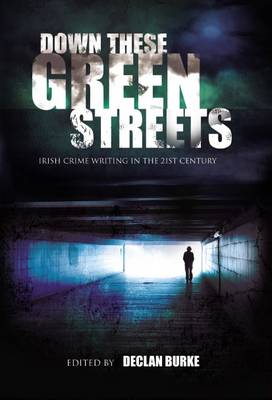
EURO CRIME
Reviews

Burke, Declan (Editor) - 'Down These Green Streets: Irish Crime Writing in the Twenty-First Century'
Paperback: 368 pages (May 2011) Publisher: Liberties Press ISBN: 1907593195
DOWN THESE GREEN STREETS, edited by Declan Burke, is an anthology of essays and short stories centred on Irish crime writing, featuring some very well known writers, such as John Banville, Tana French and John Connolly, and a bevy of less well known but highly talented authors. This anthology is split into three sections, titled "Out of the Past", "Thieves Like Us", and "Kiss Tomorrow Goodbye", with two very thoughtful, detailed pieces at the beginning and end - the Introduction by Professor Ian Ross and the Afterword by Fintan O'Toole.
"Out of the Past", as the title suggests contains a series of chapters looking at the historical and literary roots of Irish crime fiction, including: John Connolly's take on why Irish crime fiction didn't follow the mid-20th century route of English style Golden Age nor US style hardboiled crime; Cora Harrison's explanation of a very old Irish justice system of community justice and how she chose this, and the beautiful rural area of the Burren, as key features of her historical series; Ruth Dudley Edwards's essay on the life and work of Liam O'Flaherty; Adrian McKinty's salient points about how Irish crime fiction developed in Northern Ireland, and its responses to the Troubles and IRA bombings, and Eoin McNamee providing background to his recent novel BLUE ORCHID, based on a 1950s miscarriage of justice. There are also short stories by Kevin McCarthy and Jane Casey in this section.
The middle section, "Thieves Like Us" focuses on very recent Irish writing and history. Declan Hughes and Colin Bateman give personal accounts of the inspiration for their writing, and Paul Charles gives his perspective on the influence of emigration and exile in Irish crime fiction. Niamh O'Connor and Gerard Brennan's chapters are more factual: Niamh O'Connor summarises the recent criminal cases that have caught the public attention and featured in true crime books, and Gerard Brennan does a survey of literature following the Good Friday agreement in Northern Ireland. Ingrid Black (pseudonym for a real life husband and wife author team) provide a biting chapter about escaping Irishness. The end of this section contains a key piece in this book, Declan Burke's interview with John Banville, discussing his writing, the differences between writing as Benjamin Black and John Banville and the stylistic/literary influences on the Benjamin Black persona. The short stories in this section are by Stuart Neville and Alex Barclay.
The last section, "Kiss Tomorrow Goodbye" looks at current Irish crime writing in a wider socio-cultural context, and also looks at Irish crime-themed drama and films (in chapters provided by Sarah Keating and Tara Brady respectively). Gene Kerrigan and Arlene Hunt provide particularly thought provoking chapters. Gene Kerrigan's chapter supports David Peace's assertion that crime fiction should be "brutal, harrowing and devastating as the violence of the reality it seeks to document", opening with a compelling account of a murder he witnessed, and Arlene Hunt's chapter looks at the ripple effect of murder cases, leading to a gradual loss of innocence and sense of security in her rural childhood. Brian McGilloway's chapter is also very interesting, looking at the role of the border between North and South, and the psychological and physical implications of border life. Andrew Nugent takes the spiritual theme further, explaining how religion has influenced his work, and the important role of hope in his novels. Neville Johnson's chapter looks at the influence of his background on his realist working class vernacular novels, and his work with prison writing-workshops, and Gerry O'Carroll, of the influence of his decades as a Garda on his novel.
DOWN THESE GREEN STREETS is an excellent, varied collection of essays and short stories, looking at Irish crime fiction in both its historical and present day context, with much of interest to anyone interested in modern day Ireland and its cultural life. It is very much a book to dip into, rather than to read straight through in one setting. The authors by and large convey their wealth of knowledge in a highly readable, enjoyable style, and it's a great idea to include short stories in this compilation, as a nice counterpoint to the various analyses of Irish fiction. There is a thorough bibliography at the end of the book, with ample information for anyone interested in following up any tantalising snippets of works given in the essays.
Laura Root, England
October 2011
More crime fiction reviews can be found on the Reviews page.